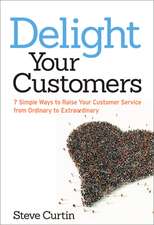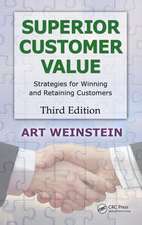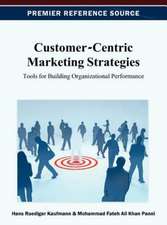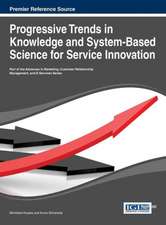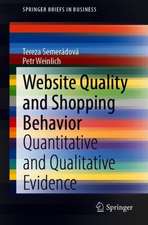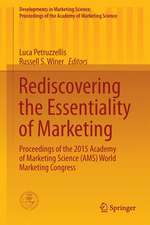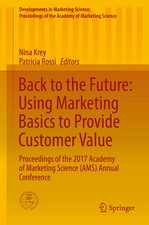Marketing Opportunities and Challenges in a Changing Global Marketplace: Proceedings of the 2019 Academy of Marketing Science (AMS) Annual Conference: Developments in Marketing Science: Proceedings of the Academy of Marketing Science
Editat de Shuang Wu, Felipe Pantoja, Nina Kreyen Limba Engleză Hardback – 16 iun 2020
Founded in 1971, the Academy of Marketing Science is an international organization dedicated to promoting timely explorations of phenomena related to the science of marketing in theory, research, and practice. Among its services to members and the community at large, the Academy offers conferences, congresses, and symposia that attract delegates from around the world. Presentations from these events are published in this Proceedings series, which offers a comprehensive archive of volumes reflecting the evolution of the field. Volumes deliver cutting-edge research and insights, complementing the Academy’s flagship journals, the Journal of the Academy of Marketing Science (JAMS) and AMS Review (AMSR). Volumes are edited by leading scholars and practitioners across a wide range of subject areas in marketing science.
| Toate formatele și edițiile | Preț | Express |
|---|---|---|
| Paperback (1) | 1400.35 lei 6-8 săpt. | |
| Springer International Publishing – 16 iun 2021 | 1400.35 lei 6-8 săpt. | |
| Hardback (1) | 1406.83 lei 6-8 săpt. | |
| Springer International Publishing – 16 iun 2020 | 1406.83 lei 6-8 săpt. |
Din seria Developments in Marketing Science: Proceedings of the Academy of Marketing Science
- 15%
 Preț: 648.24 lei
Preț: 648.24 lei - 9%
 Preț: 857.72 lei
Preț: 857.72 lei - 24%
 Preț: 1150.53 lei
Preț: 1150.53 lei - 24%
 Preț: 863.52 lei
Preț: 863.52 lei - 24%
 Preț: 884.73 lei
Preț: 884.73 lei - 24%
 Preț: 830.18 lei
Preț: 830.18 lei - 24%
 Preț: 834.02 lei
Preț: 834.02 lei - 20%
 Preț: 598.44 lei
Preț: 598.44 lei - 20%
 Preț: 610.96 lei
Preț: 610.96 lei - 20%
 Preț: 570.11 lei
Preț: 570.11 lei - 24%
 Preț: 858.70 lei
Preț: 858.70 lei - 24%
 Preț: 818.81 lei
Preț: 818.81 lei - 24%
 Preț: 878.02 lei
Preț: 878.02 lei - 20%
 Preț: 614.62 lei
Preț: 614.62 lei - 24%
 Preț: 862.46 lei
Preț: 862.46 lei - 20%
 Preț: 624.60 lei
Preț: 624.60 lei - 20%
 Preț: 562.85 lei
Preț: 562.85 lei - 24%
 Preț: 1163.14 lei
Preț: 1163.14 lei - 24%
 Preț: 861.46 lei
Preț: 861.46 lei - 24%
 Preț: 1177.97 lei
Preț: 1177.97 lei - 20%
 Preț: 613.50 lei
Preț: 613.50 lei - 24%
 Preț: 866.94 lei
Preț: 866.94 lei - 20%
 Preț: 612.45 lei
Preț: 612.45 lei - 24%
 Preț: 833.84 lei
Preț: 833.84 lei - 20%
 Preț: 613.32 lei
Preț: 613.32 lei - 24%
 Preț: 851.10 lei
Preț: 851.10 lei - 20%
 Preț: 588.45 lei
Preț: 588.45 lei - 24%
 Preț: 859.06 lei
Preț: 859.06 lei -
 Preț: 408.56 lei
Preț: 408.56 lei - 20%
 Preț: 610.46 lei
Preț: 610.46 lei - 24%
 Preț: 846.91 lei
Preț: 846.91 lei - 24%
 Preț: 875.08 lei
Preț: 875.08 lei - 20%
 Preț: 612.45 lei
Preț: 612.45 lei - 24%
 Preț: 859.70 lei
Preț: 859.70 lei - 24%
 Preț: 829.01 lei
Preț: 829.01 lei - 24%
 Preț: 853.69 lei
Preț: 853.69 lei - 24%
 Preț: 829.71 lei
Preț: 829.71 lei - 24%
 Preț: 873.73 lei
Preț: 873.73 lei - 24%
 Preț: 891.10 lei
Preț: 891.10 lei - 20%
 Preț: 630.06 lei
Preț: 630.06 lei - 24%
 Preț: 853.69 lei
Preț: 853.69 lei - 18%
 Preț: 1408.40 lei
Preț: 1408.40 lei - 20%
 Preț: 602.97 lei
Preț: 602.97 lei - 24%
 Preț: 1076.36 lei
Preț: 1076.36 lei - 24%
 Preț: 879.91 lei
Preț: 879.91 lei - 20%
 Preț: 631.49 lei
Preț: 631.49 lei - 20%
 Preț: 592.79 lei
Preț: 592.79 lei - 20%
 Preț: 594.28 lei
Preț: 594.28 lei - 24%
 Preț: 1163.84 lei
Preț: 1163.84 lei
Preț: 1406.83 lei
Preț vechi: 1715.65 lei
-18% Nou
Puncte Express: 2110
Preț estimativ în valută:
269.19€ • 281.82$ • 222.74£
269.19€ • 281.82$ • 222.74£
Carte tipărită la comandă
Livrare economică 05-19 aprilie
Preluare comenzi: 021 569.72.76
Specificații
ISBN-13: 9783030391645
ISBN-10: 3030391647
Ilustrații: XLIX, 674 p. 18 illus., 2 illus. in color.
Dimensiuni: 155 x 235 mm
Greutate: 1.18 kg
Ediția:1st ed. 2020
Editura: Springer International Publishing
Colecția Springer
Seria Developments in Marketing Science: Proceedings of the Academy of Marketing Science
Locul publicării:Cham, Switzerland
ISBN-10: 3030391647
Ilustrații: XLIX, 674 p. 18 illus., 2 illus. in color.
Dimensiuni: 155 x 235 mm
Greutate: 1.18 kg
Ediția:1st ed. 2020
Editura: Springer International Publishing
Colecția Springer
Seria Developments in Marketing Science: Proceedings of the Academy of Marketing Science
Locul publicării:Cham, Switzerland
Cuprins
Chapter1. Exploring Customer Engagement and Sharing Behavior in Social Media Brand Communities: Curvilinear Effects and the Moderating Roles of Perceived Innovativeness and Perceived Interactivity.- Chapter2. Between a Banker and a Barbie: The Illusions of Social Media.- Chapter3. A Longitudinal Review of Models in Marketing Research.- Chapter4. What would we Hear if we Really Listened? Using I-poems in Qualitative Marketing Research.- Chapter5. Managing Marketing Strategies for Start-Up Enterprises: Analyzing Cross-Sectional Metrics for Measuring Business Performance.- Chapter6. Effects of Environmental and Social Sustainability Perceptions on Willingness to Co-Create from Consumer Perspective.- Chapter7. Decision-Making and Interruptions.- Chapter8. Buying Authentic Luxury Products or Counterfeits: The Role of Benign and Malicious Envy.- Chapter9. Excitement or Fear? The Effect of a Personalized In-Store Experience on Consumers.- Chapter10. All Hands on Deck Special Session: Cultivating Socially Responsible Consumers and Corporations.- Chapter11. All Hands on Deck Special Session: Motivating or De-motivating Responsible Consumption? The Divergent Influences of Moral Emotions.- Chapter12. All Hands on Deck Special Session: Personifying Socially Responsible Corporations: Scale Development and Validation.- Chapter13. All Hands on Deck Special Session: How CSR and Servant Leadership Climate Affect Employee Cynicism and Work Meaning?.- Chapter14. Non-Compliance is a Double-Edged Sword.- Chapter15. A Critical Review of Institutional Theory in Marketing.- Chapter16. Does the Environmentally Friendliness of a Service Invite Customer Loyalty? The Role of Positive Emotions.- Chapter17. Extended Service Plans and Buyer Perceptions and Behaviors in Automobile Industry.- Chapter18. Special Session: “The World Needs Storytellers”: New Research Avenues for Storytelling in Marketing.- Chapter19. Special Session: Measuring Salesperson Storytelling.- Chapter20. How do InternationalCo-branding Alliances Affect Host Country Consumers’ Purchase Intention?.- Chapter21. Does Model Ethnicity Matter in International Advertising? A Literature Review on Model Ethnicity and Related Topics.- Chapter22. Product Innovation Determinants and Export Performance in French and Ukrainian SMEs. Chapter23. Special Session: The (Co-)creation of Brand Heritage.- Chapter24. Special Session: Dehumanization of Robotic Assistants and Subsequent Unethical and Abusive Customer Behavior in Frontline Encounters.- Chapter25. Special Session: Rise of the Service Robots: Exploring Consumer Acceptance.- Chapter26. Exploration of the Role of Packaging Design for Multi-tier Private Brands.- Chapter27. Understanding Risk Statements within Drug Injury Advertising.- Chapter28. The Effect of Social Distance on Donations to Care versus Cure.- Chapter29. Customer Reactions to Voluntary Use of Automated Service Interactions.- Chapter30. Challenges in Usage of Unstructured Data in Marketing Decision Making.- Chapter31. An Investigation of the Effect of Retargeting on Willingness-to-Pay in Online Environments.- Chapter32. Influence of Web Design Features on Attitudes and Intentions in Travel Decision Making.- Chapter33. Virtual Reality (VR) Content is the New Reality for Destination Marketing Organizations: Investigating the Role of VR as a Destination Branding Tactic. Chapter34. Explaining Sustainable Consumption: A Theoretical and Empirical Analysis. Chapter35. Special Session: Digital Data, Security, and Platform Design: Is Marketing the Problem or Solution?.- Chapter36. It Looks Good so Let’s Show it off: A Psychographic Segmentation of Instagrammers.- Chapter37. I Hate this Brand! A Classification of Brand Haters Based on their Motivations and Reactions.- Chapter38. Competitive Teamwork: Developing a Team-Based Selling Competition in an Undergraduate Professional Selling Class.- Chapter39. Special Session on Research Opportunities in Direct Selling.- Chapter40. Special Session: AnInternational Perspective of Overcoming Difficulties and Challenges in Doctoral and Early Career Years.- Chapter41. Does Training Teachers in Financial Education Improve Students’ Financial Well-Being?.- Chapter42. Special Session: How does Marketing Fit in the World? Questions of Discipline Expertise, Scope, and Insight. Chapter43. Beyond Hedonic Consumption: The Role of Eudaimonic Value in Consumer-Brand Relationships.44. Disentangling the Meanings of Brand Authenticity.- Chapter45. Exploring Facets of Spokesperson Effectiveness in B2B Advertising: What Works and what doesn’t?.- Chapter46. Return on Investment of Effective Complaint Management: Synthesis and Research Directions.- Chapter47. Distance is Worth! Impacts of Spatial Distance between Model and Product on Product Evaluation.- Chapter48. The Study of Different Factors Affecting Salesperson Deviance.- Chapter49. Why Narcissists Prefer Genuine to High-Quality Counterfeit Luxury: The Role of Authentic and Hubristic Pride.- Chapter50. Time-Based Deals: How Non-Monetary Discounts can Reduce the Post-Promotion Dip.- Chapter51. From Psychological Myopia to Food Myopia: A Consumer Perspective.- Chapter52. Co-creators Endorsing Their Winning Product Idea in Ads: Dealing with Brand Audiences’ Skepticism.- Chapter53. Right Digit Effect and Subjective Relative Income.- Chapter54. Big Data Analytics, New Product Ideas and Decision Making.- Chapter55. Salesperson Intrinsic and Extrinsic Motivation Revisited: A Combinatory Perspective.- Chapter56. Non-conscious Effect of Moral Identity Prime on Perceived Reasonableness and Affective Account on Customer Satisfaction.- Chapter57. Digital Advocacy among Industrial Employees.- Chapter58. When My Brand does Something Morally Wrong.- Chapter59. The Evolution of Influencer-Follower Relationships: A Life-Cycle Approach.- Chapter60. How and when does Functional Diversity Impact Sales Team Effectiveness.- Chapter61. Love Consumption at the Digital Age: Online Consumer Review andRomantic Gift Giving.- Chapter62. Outcomes of Dialogic Communication of Corporate Social Responsibility (CSR): Strengthening Brand Loyalty through Online Brand Community Engagement, Brand Trust and CSR Authenticity.- Chapter63. Digital Customer Empowerment Tools for Marketers.- Chapter 64. A Longitudinal Study of Sustainability Attitudes, Intentions, and Behaviors.- Chapter65. The Impact of Culture on Humorous Ads.-Chapter66. RELQUAL-determinants on Satisfaction in Buyer-Supplier Relationship of Puerto Rican SMEs.- Chapter67. Customer Experience of Value: Some Insights into the Satisfaction-Loyalty Link and Customer Loyalty Retention.- Chapter68. Special Session: How the Desire for Unique Products Strengthens the Link between Luxury Attitudes and Sustainability Behaviors.- Chapter69. Understanding Information Bias: The Perspective of Online Review Component.- Chapter70. Factors Affecting Consumer Responses to Brand Advertising on Social Media.- Chapter71. How Many Likes are Good Enough? An Evaluation of Social Media Performance. Chapter72. To Kneel or not to Kneel? Just Do It! Assessing Consumer Responses to Organizational Engagement in Political Discourse.- Chapter73. Inferences about Target Marketing from Languages on Website and its Implications.- Chapter74. Consumer Response to Sport Sponsor’s Message Articulation and Activation on Twitter.- Chapter75. Exploring Usage Motives for Corporate Multimodal Mobility Services: A Hierarchical Means-End Chain Analysis.- Chapter76. The Effect of Emoji Incongruency in Social Media.- Chapter77. Me, Myself and my Smartphone: Antecedents of Smartphone Attachment. Chapter78. Do Death Thoughts Influence the Choice of Brand Loyalty Program? A Case of Lebanon.- Chapter79. Involvement and Brand Engagement Outcomes in Facebook Brand Posts: A Gender Twist. Chapter80. Implications of the Developments in Metaphors Research for Marketing Communications: A Review and Research Agenda. Chapter81. The Joint Impact of Goal Type and Goal Completion Magnitude on Consumer’ Post-Goal-Completion Behavior.- Chapter82. A Moment of Influence: Understanding the Customer Experience after Receiving a Penalty.- Chapter83. Strategic Tripod in Internet-Enabled Market: Consumer Self-Construal Level, Consumer Involvement, and Firm Resources.- Chapter84. Preliminary Tests of the Consumer Normalcy Scale.- Chapter85. The Impact of Advertising Appeals on Consumers’ Perception of an Advertisement for a Technical Product and the Moderating Roles of Endorser Type and Endorser Age. Chapter86. Online vs. Face-to-Face: How Customer-to-Customer Interactions Impact Customer Experience Behaviors.- Chapter87. The Effect of Fear, Threat, and Trust among Voters in the 2016 U.S. Presidential Election. Chapter88. Towards a Model of Inclusive Ethnic Advertising.- Chapter89. Customer Engagement with Augmented Reality Mobile Apps- Chapter90. How Organizations can Capitalize on Customer-Caused Failures.- Chapter91. Self-Gift, Luxury Consumption and Materialism: The Way to Happiness!.- Chapter92. Why do Consumers Procrastinate and what Happens Next?.- Chapter93. Food Acculturation of Professional Expatriates: A Cross-Cultural Study.- Chapter94. Terroir and its Evocation: What a Wine Terroir of Origin Evokes? An Exploratory Qualitative Study of the Meaning of Terroir Product Consumption.- Chapter95. Social Media Sentiment, Customer Satisfaction, and Stock Returns.- Chapter96. Either Bandwagon Effect or Need for Uniqueness? Motivational Factors Driving Young Adult Consumers’ Luxury Brand Purchases.- Chapter97. Pleasure versus Healthiness in Multi-Ingredient Sustainable Foods: How Centrality Influences Performance.- Chapter98. The Impact of Sonic Logos on Brand Perceptions.- Chapter99. Gifting Practices: Is it Really the Thought that Counts.- Chapter100. Special Session: How does Marketing Fit in the World? Questions of Discipline Expertise, Scope, and Insight.- Chapter101. Social Listening: Adapting Customer and Competitive Intelligence to the Digital Era.- Chapter102. Qualitative Insights into Organic Food: Perceptions of Indian and U.S. Consumers.- Chapter103. How Women Respond to Female Empowerment Songs.- Chapter104. Why I Will Not Use You for My Campaign: The Relationship between Brand Managers and Sportswomen.- Chapter105. Candidates as Experiential Brands in U.S. Presidential Elections.- Chapter106. Effects of Mindset on International Marketing Decisions: The Moderating Role of Psychic Distance.- Chapter107. An Exploratory Study of Globalizing Consumers’ Materialism Tendencies in a Multicultural “Global” Marketplace.- Chapter108. Numerical Framing and Emotional Arousal as Moderators of Review Valence and Consumer Choices.- Chapter109. Men and the Food Leftovers of Attractive Others.- Chapter110. Does Technological Self-Efficacy Decrease New Salesperson Job Insecurity.- Chapter111. Special Session: Marketing and Consumer Wellbeing in Digital Environment.- Chapter112. Modelling for Mobile: Developing the mUTAUT Model.- Chapter113. Opening the Innovation Process: The Interrelationship of Firm Reputation and Strategic Innovation Change.- Chapter114. Value Destruction in Multichannel Services.- Chapter 115. Women Leaders and Firm Performance: Unpacking the Effect of Gender and Trust.- Chapter116. Online Sensory Marketing: The Crossmodal Effect of Background Music and the Look and Feel of a Webshop on Consumer Reactions.- Chapter117. Do Salespeople Trust their Customers? Toward an Understanding of Trust in B2B Relationships under Uncertainty.- Chapter118. Proposing a Framework of Observe-Hypothesize-Challenge-Resolve (OHCR) Teaching Moves for Knowledge Construction in Marketing Pedagogy.- Chapter119. The Effect of the User Experience Cycle on the Adoption of Smart Technologies for Innovative Consumers: The Case of Mass-fashion and Luxury Wearables.- Chapter120.- Do Fine Feathers Make Fine Birds? Examining the Role of a Product’s Packaging Functionality on Consumer Behavior.- Chapter121. An Abstract onEvaluating the Use of Curated Digital Magazines in Marketing Courses: A Comparative Analysis.- Chapter 122. Special Session: Looking for a New Research Partner: Find your Perfect “Researcher Match”: An Abstract.- Chapter 123. Revising the Concept and Effectiveness of the Customer Orientation of Salespeople: An Abstract.- Chapter 124. An Abstract: Value from Experiences and Customer Happiness: Implications for Customer Experience Management.- Chapter125. How do Customers Respond to the Use of Self-Service Technologies? An Empirical Study from China: An Abstract.- Chapter126. The Brand Identity of a Football Manager: The Case of Arsène Wenger: An Abstract.- Chapter127. Virtual Trade Show (VTS): A Systematic Literature Review: An Abstract.- Chapter128. Confronting the Customer-Engagement Paradox in Sales-Leader Succession: An Abstract.- Chapter129. An Abstract: Consumers’ Non-Participation in Creative Crowdsourcing: Exploration through the Lenses of Meaning of Work.- Chapter130. Exploring the Role of Authentic Assessment on the Development of Future Marketers: An Abstract.- Chapter131. How Cultural and Institutional Dimensions Shape Consumer-Brand Relationships’ Effects on Brand Loyalty: An Abstract.- Chapter132. Synthesizing Negative Critical Incidents: Integration of Service Failure-Recovery and Brand Transgression Streams: An Abstract.- Chapter133. Bandwagon Consumption among the Black Middle Class.- Chapter134. The Issues and Impacts of Programmatic Advertising in the Financial Sector: An Abstract.- Chapter135. Marketing when Insiders are Locked in: An Abstract.- Chapter136. Variability of Brands: Perspectives of Perceived Entitativity: An Abstract.- Chapter137. An Abstract: An Affinity for Variety: Umbrella Brands and Buyer Behavior.- Chapter138. Think versus Feel: Two Dimensions of Brand Anthropomorphism: An Abstract.- Chapter139. Does Brand Origin Really Matter in the Luxury Sector? The Impact of Consumer Origin and Consumer Ethnocentrism on Consumers’ Responses: An Abstract.- Chapter140. The Paradigm of Sharing: A Unifying Conceptualization: An Abstract.- Chapter141. From Third Place to Third Space: How Social Networking Sites Shape the Perception of our Social Spaces: An Abstract.- Chapter142. The Interaction of Consumer, Endorser and Brand Personality in Social Influencer Marketing: An Abstract.- Chapter143. Avenues to Optimize Strategic Decision Making to Drive Firm Performance and Market Success: An Abstract.- Chapter144. How can Targeted Price Promotion Create Value for Firms in B2C Relationships? A Systematic Review and Research Agenda: An Abstract.- Chapter145. Knowledge is Power: The Moderating Effect of Product Knowledge: An Abstract.- Chapter146. Overcorrection in Mixed Racial Purchasing: An Abstract.- Chapter147. The Effects of Person-Team Fit on Learning Goal Orientation and Salesperson Performance: An Abstract.- Chapter148. When Crowdsourcing Proposition Rejection Reinforces Brand Relationship: An Abstract.- Chapter149. Co-creation for Customer Engagement Management: When do they Want to Talk? An Abstract.- Chapter150. What Frugal Products are and Why they Matter: An Abstract.- Chapter151. Monetary and Nonmonetary Cost Factors in the Cycle of Unhealth.- Chapter152. In-Game Advertising and Gamers’ Behavior in App Environment: An Abstract.- Chapter153. Predicting the Future of Advertising Creative Research: An Abstract.- Chapter154. Investigating the Effect of Mobile In-store Promotions on Purchase Intention: Is WhatsApp more effective? An Abstract.- Chapter155. Influential Language, Imagery, and Claims in Print Advertising: An Abstract.- Chapter156. Sustainable Promises? The Evolution of Business Models Founded on the Promise of Corporate Social Responsibility: An Abstract.- Chapter157. Point of Sale Donations from a Managerial Perspective: An Abstract.- Chapter158. When Extremely Good is not Enough for Sustainability Disclosures: An Abstract.- Chapter159. Determining Factors of the Sustainability Orientation: An Examination from the Past to the Present: An Abstract.- Chapter160. A Proposed Moderated Mediation Model of Customer Loyalty Outcomes: An Abstract.- Chapter161. Patron Sentiment of Employee-Customer Interaction: Exploring Hotel Customer Reviews through Machine Learning: An Abstract.-Chapter162. The Effectiveness of Sponsor-Linked Marketing within a Rivalry Context: The Effect of Team Sponsorship on Implicit and Explicit Brand Associations: An Abstract.- Chapter163. Exposing Underage Consumers to Alcohol Branding in Sport Sponsorship: An Abstract.-Chapter164. When does Creativity Matter? The Impact of Consumption Motive and Claim Set-Size: An Abstract.- Chapter165. An Investigation of Slacktivism in Online Donation Campaigns: An Abstract.- Chapter166. An Abstract on the Effects of Psychological Distance on Nostalgic Cultural Brands and Consumers' Purchase Intentions: A Construal Level Theory Perspective.- Chapter167. Utilitarian versus Hedonic Brands: Cognitive and Affective Country Image Components: An Abstract.- Chapter168. Consumer Acculturation as a Process: A Propensity to Acculturate Index and an Adapted Acculturation Scale: An Abstract.- Chapter169. Investigating the Effect of Social Comparison on Helping Behavior: The Moderating Role of Self-Construal Level and the Mediating Role of Emotion: An Abstract.- Chapter170. An Abstract: How does Providing Financial Information Impact Retirement Intentions?.- Chapter171. The Power of Collective Brand Defending in Mitigating Negative eWOM: An Abstract.- Chapter172. The Usefulness of Brand Polarization to Various Parties: An Abstract.- Chapter173. The Picture of Luxury: Millennials’ Relationship with Luxury Brands: An Abstract.- Chapter174. The Influence of Brand Acquisition on Perceived Authenticity: An Abstract.- Chapter175. A Comparison of the Determinants of Online Shopping Cart Usage in the US and China: An Abstract.- Chapter176. An Empirical Study on the Relationship between Cross-Channel Integration and Offline Store Patronage Behavior: An Abstract.- Chapter177. From the Store to the Kitchen: The Effects of an Ambient Situated Health Food Scent on Healthy Food Choices: An Abstract.- Chapter178. Use of Surveytainment Elements in Knowledge-Assessment Tests: An Abstract.- Chapter179. Soft Skills as an Assessed Course Component: An Abstract.- Chapter180. The Need for Franchising Curriculum to Deliver Value to Underrepresented Groups: An Abstract.- Chapter181. I Pay, therefore I Am (An A): Co-Creation of Value in Higher Education: An Abstract.- Chapter182. The Future of Terroir: An Abstract.- Chapter183. Residents’ Support for Sustainable Tourism Development: The Mediating Role of Life Satisfaction: An Abstract.- Chapter184. A Study of Camino de Santiago Hikers: An Abstract.- Chapter185. The Effect of Big Data on Small Firm Marketing Capabilities: An Abstract.- Chapter186. Frontiers of Internal Marketing: How Cultures of Procrastination and Improvisation Drive Project Performance:An Abstract.- Chapter187. The Empirical Link between Export Diversification and Export Performance: Strategic and Resource Contingencies: An Abstract.- Chapter188. Learning Orientation and Market Orientation: The Mediating Role of Employees’ Absorptive Capabilities: An Abstract.- Chapter189. The Effect of Fake News on the Relationship between Brand Equity and Consumer Responses to Premium Brands: An Abstract.- Chapter190. Fake News and the Top High-Tech Brands: A Delphi Study of Familiarity, Vulnerability and Effectiveness: An Abstract.- Chapter191. The Dominant and Underexamined Role of Brand’s Moral Character in Determining Brand Perception and Evaluation: An Abstract.- Chapter192. Do U.S. Consumers Want More Power over their Personal Data? A Preliminary Study on Consumer Data Right Preferences: An Abstract.- Chapter193. A Review and Weight Analysis of Factors Affecting Helpfulness of Electronic Word-of-Mouth Communications.- Chapter194. Leadership Effectiveness and Marketing Successful Stories in Latin America: An Abstract.- Chapter195. Leadership Effectiveness and Marketing Successful Stories in Latin America: An Abstract.- Chapter196. Should I Care for the Environment or Myself? Ads for Green Products: An Abstract.- Chapter197. Examination of the Preference of French Consumers in the Fashion Sector: How Important is Ethical Attribute? An Abstract.- Chapter198. The Marketing of International Humanitarian Aid in a Changing Global Marketplace: An Abstract.- Chapter199. The Value of Psychological Capital for Customer Participation Management: An Abstract.- Chapter200. An Abstract: Burdens of Health Service Access: Examining Prospective Customers Perceptions of Clinical Help-Seeking.- Chapter201. Demystifying Perceived Psychological Proximity for Hedonic Product Choices: An Abstract.- Chapter202. Short or Long? The Right Combination of Time Duration, Cause Type, and Product Type in Cause-Related Marketing: An Abstract.- Chapter203. Virtual Reality Branding Campaigns, Impact and Public Perception: An Abstract.- Chapter204. Consumer Response to Product Safety Recall: An Empirical Research from China: An Abstract.- Chapter205. When the Star Beckons: Celebrity-Branded Products and Retailer Resonance: An Abstract.- Chapter206. An Abstract: Consumers’ Quality Perception of Food Shape Abnormality: Effects on Customer Perceived Value and Consumer Behavior.- Chapter207. Examining Primacy and Recency Effects in Hypocritical CSR News: An Abstract.- Chapter208. High Growth Private Companies: Values-Led and Profitable: An Abstract.- Chapter209. Chinese Consumers’ Attitudes of Chinese versus Western Fashion Brands: An Exploration of Possible Predictor Variables Related to Individual and Cultural Values: An Abstract.- Chapter210. Using the Online Search Volume to Predict Performance: An Abstract.- Chapter211. Reappraising Effects of Word-of-Mouth Communication on the Innovation Diffusion Process: An Abstract.- Chapter212. Special Session: New Directions in B2BSales and Marketing Research AMS 2019 Annual Conference, Vancouver: An Abstract.- Chapter213. Special Session: Brand Heritage: Cross Cultural Perceptions: An Abstract.- Chapter214. Effective Pricing Strategies: Investigating the Contrast between Theory and Practice: An Abstract.- Chapter215. Price Priming Effects in Online Display Ads: An Abstract.- Chapter216. Examining Country Image in Expert Electronic Word-of-Mouth: An Abstract.- Chapter217. An Abstract: A Value-based Model of Consumer Smartphone Usage for Online Transactions: The Role of Consumer Characteristics and Purchasing Situation.- Chapter218. Effects of Double Language Labeling in the Context of FMCG-Products: A Mixed-Methods Approach: An Abstract.- Chapter219. What Makes the Difference? Employee Social Media Brand Engagement: An Abstract.- Chapter220. Why the Shortened ADAPTS Scale Should Not Be Used for Sales Students: An Abstract.-Chapter221. White Coats, Mild Manners, and Good Doctors? When Red Decreases Perception ofDominance: An Abstract.- Chapter222. Value Co-Creation and Behavioral Consequences: Evidence from Brazilian Consumers: An Abstract.- Chapter223. Subjective Financial Deprivation and Budget Allocation Preferences: An Abstract.- Chapter224. Is there a Self beyond Identity: An Abstract.- Chapter225. How Common or Scientific Name Works? The Influence of Food Type and Regulatory Focus on the Choice of Ingredient Name: An Abstract.- Chapter226. The Spill-Over Effect of the Emotional Reaction to the use of Internet on the Intention to use Internet of Things (IoT) Services: An Abstract.- Chapter227. Online Environment-Product Congruence: The Role of Experience and Product Consumption Type on Product Liking: An Abstract.- Chapter228. How Peer-to-Peer Sharing Promotes Product Purchase: An Abstract.- Chapter229. An Abstract: Catalog and Online Retailing: Effects of Signals of Quality and Need for Cognition.- Chapter230. Perceptions of Power in the Digital Era: An Investigation of Idea Crowdsourcing versus Crowdvoting: An Abstract.- Chapter231. Gamification Research in View of Bibliometrics: A Literature Trend, Bibliographic Coupling, and Co-citation Analysis: An Abstract.- Chapter232. The Conceptualisation and Measurement of Perceived Value in Social Media: The Case of Facebook Brand Pages.- Chapter233. An Abstract: Interacting and Learning through Cross-Functional Product Development Teams: Driving New Product Creativity, Design Value, and Product Advantage.- Chapter234. Product’s Digital Transformation Effect on Perceived Luxury Level and Brand Authenticity: The Watch Industry Case: An Abstract.- Chapter235. New Product Advantage Infused by Marketing and Technical Resources: Does Modularity Design Matter? An Abstract.- Chapter236. Responses to Female Sexual Power Portrayals in Ads: An Abstract.- Chapter237. Psychological Effects of Social Exclusion on Stereotyping and Consumer Behavior: An Abstract.- Chapter238. Authentic Ethnic Advertisements Perception: An Abstract.- Chapter239. Personalized Online Recommendations and the Effect of Trust and Valence: An Abstract.- Chapter240. The Influence of Luxury Brands’ Firm Engagement on Customer Engagement on Social Media: An Abstract.- Chapter241. Supply Chain Resilience on Business Continuity Programs: The Role of Anticipated, Inherent and Adaptive Resilience: An Abstract.- Chapter242. Corporate Social Responsibility beyond Borders: US Consumer Boycotts of a Global Company over Sweatshop Issues in Supplier Factories Overseas: An Abstract.- Chapter243. Every Coin has Two Sides: The Negative Effects of Brand Social Power, the Dual Character of Face, and Counterfeit Luxury Consumption: An Abstract.- Chapter244. Assessing Strategic Customer Behavior under Bounded Rationality: An Abstract.- Chapter245. Role of Task Difficulty in Brand Image Measurements: An Abstract.- Chapter246. “What-are-you-looking-at?”: Implicit Behavioural Measurement Indicating Technology Acceptance in the Field of Automated Driving.- Chapter247. The Effect of Consumers’ Asset Specificity Sensitivity on Mobile Payment Service Adoption: The Role of Switching Cost and Product Compatibility: An Abstract.- Chapter248. Personalization Perceptions in Retail Technology Adoption: The Mediating Role of Dependency and Intrusiveness: An Abstract.- Chapter249. Comparing Product Policy’s Effectiveness for E-Commerce Companies: An Abstract.- Chapter250. Top Management Emphasis and Silo-Spanning Communication for Marketing Knowledge Integration: An Empirical Examination: An Abstract.- Chapter251. Brand Architecture Challenges in the Digital Age in the Context of a Broad Brand: An Abstract.- Chapter252. Are all Customer Empowerment Strategies Equally Beneficial? A Relative Efficacy and Issue of the Campaign Accounts: An Abstract.- Chapter253. Leveraging User-Generated Content for Demand-Side Strategy: An Abstract.- Chapter254. An Abstract: Sense and Sensibility: What are Customers Looking for in Online Product Reviews?.- Chapter255. PoliceBrutality and Running Shoes: Authentic Brand Activism or Woke Washing: An Abstract.- Chapter256. The Lazarus Touch of Heritage: Place Branding, a Multi Stakeholder Study: An Abstract.- Chapter257. The Influence of Retail Return Policies on Brand Image: An Abstract.- Chapter258. Bridging Islands: Boundary Resources in Solution Networks: An Abstract.- Chapter259. Value Proposition with the Relevant Business Ecosystem: The Moderating Role of Customer’s Business Change.- Chapter260. How can Supervisors Help Frontline Employees Deal with Customer Mistreatment? An Abstract.- Chapter261. An Abstract: Wearing Expertise on your Sleeve: Increasing Customer Service Expectations through Employee Apparel.- Chapter262. Integrating Social and Activity Utilities to Explain Consumption: An Abstract.- Chapter263. Does Sampling Order Moderate the Effect of Autotelic Need for Touch on Product Evaluation: An Abstract.- Chapter264. Shopping Mall Values, Customer Satisfaction and Loyalty: The Moderation ofEducation Level in Morocco: An Abstract.- Chapter265. Usability of Automated Driving Functions: A User Experience Study.- Chapter266. Social Media Usage, Status Consumption, and Online Public Consumption: An Abstract.- Chapter267. CSR: The Best of Both Worlds: Driving Returns to the Business and its Employees: An Abstract.- Chapter268. The Public Healthcare System as a Service Network: An Assessment through the Time: An Abstract.- Chapter269. Relative Effectiveness of Direct and Indirect Comparative Advertising: The Role of Message Framing and Gender on Believability and Attitude Certainty: An Abstract.- Chapter270. Special Session: Blockchain Technology and how it will Change Marketing: An Abstract.
Textul de pe ultima copertă
This proceedings volume explores marketing opportunities and challenges that exist in the current, fast-changing landscape of the global marketplace. Current global issues such as the rising middle class in emerging markets, disruptive technological breakthroughs, big data analytics, changing consumer habits and concerns over national trade policies have renewed ethical concerns around consumer privacy and the tools companies use to operate, market to, connect and build a relationship with their customers. Featuring the full proceedings from the 2019 Academy of Marketing Science (AMS) Annual Conference held in Vancouver, Canada, this book explores and assess the rate of change that drives companies to evaluate and adapt their marketing strategies to remain competitive.
Founded in 1971, the Academy of Marketing Science is an international organization dedicated to promoting timely explorations of phenomena related to the science of marketing in theory, research, and practice. Among its services to members and the community at large, the Academy offers conferences, congresses, and symposia that attract delegates from around the world. Presentations from these events are published in this Proceedings series, which offers a comprehensive archive of volumes reflecting the evolution of the field. Volumes deliver cutting-edge research and insights, complementing the Academy’s flagship journals, the Journal of the Academy of Marketing Science (JAMS) and AMS Review (AMSR). Volumes are edited by leading scholars and practitioners across a wide range of subject areas in marketing science.
Caracteristici
Features the full proceedings from the 47th AMS Annual Conference Explores the marketing opportunities and challenges that exist in the current, fast-changing landscape of the global marketplace Focuses on current issues such as rising middle class in emerging markets, consumer privacy concerns and disruptive technological breakthroughs



